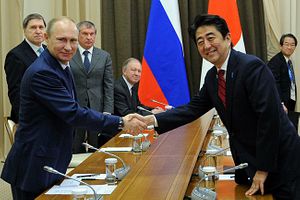A May 6 meeting in the Russian Black Sea resort city of Sochi between Russian President Vladimir Putin and Japanese Prime Minister Shinzo Abe is unlikely to result in a swift resolution in the 70-year-old dispute over the Kuril Islands, Reuters reports, based on information obtained from the Kremlin.
“It is hardly possible to expect imminent and serious progress, because this topic is pretty sensitive and it demands a very scrupulous, long and, what is more important, consistent work at the level of experts,” a Kremlin spokesperson said today. The unofficial 3-hour meeting between Vladimir Putin and Shinzo will occur at the end of a weeklong visit to Europe by Japan’s prime minister.
“We must sit down and talk in order to solve issues surrounding a peace treaty,” Shinzo Abe said before departing for Europe last Sunday, according to The Japan Times. Japan maintains that a peace treaty can only be signed once the territorial dispute is resolved.
However, Russian news agency TASS, did not mention the peace treaty or the island dispute. “The upcoming talks will be focused on the current state and the prospects of development of bilateral cooperation in trade and economy as well as in the humanitarian field,” it noted, based on information supplied by the Kremlin press service. In addition, the meeting will include an “in-depth exchange of opinions regarding pressing international issues.”
The disputed Kuril Islands, known in Japan as the Northern territories and consisting of the islands of Shikotan, Kunashiri, Etorofu, as well as the tiny Habomai islets are located in the Sea of Okhotsk in the Northwest Pacific. The islands were seized by the Soviet Union in 1945. By 1949 the Soviets had expelled all 17,000 Japanese residents of the islands.
I explained elsewhere:
Under the 1951 San Francisco Peace Treaty, Tokyo renounced “all right, title and claim to the Kuril Islands,” however, Moscow never signed the peace treaty and Tokyo refused to concede that the four disputed islands where in fact part of the Kuril chain.
(…) Japan has also repeatedly rejected a Russian offer to settle the dispute with the return of the two smallest territories of the Habomai islets and Shikotan since they only constitute 7 percent of the land in question.
The conflict is further fueled by potential offshore reserves of oil and gas, as well as rich fishing grounds.
There was optimism that the dispute could perhaps be resolved during last year’s United Nations General Assembly (UNGA), which took place in September in New York, when Japan announced that the Russian president had accepted an invitation to visit Japan (See: “Putin To Visit Tokyo as Japan, Russia Restart Peace Talks”).
Yet, hopes were quickly dashed when it was announced that Putin’s trip was postponed given that the “environment was not suitable for a visit,” according to Russian officials, after contentious bilateral negotiations at the vice foreign minister level in Moscow in October 2015 failed to make progress on the issue.
Russia has also continuously been increasing its military presence on the island chain and has announced major investments in new military and civilian infrastructure. Moscow is openly considering setting up a permanent naval base for its Pacific Fleet and has recently deployed advanced coastal missile systems on the islands.

































